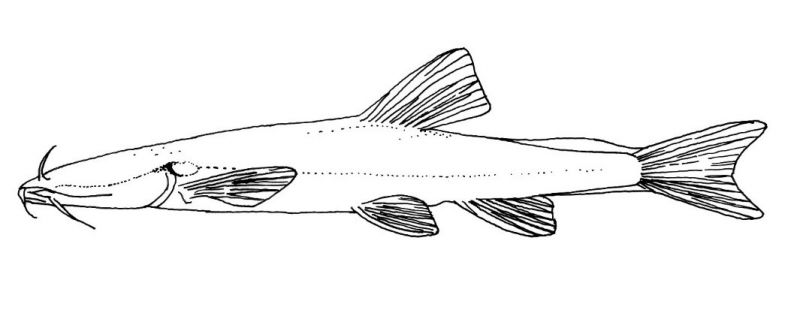Troglonectes longibarbatus
(Chen, Yang, Sket and Aljancic 1998)

| ORDER | SUB-ORDER | FAMILY |
|---|---|---|
| Cypriniformes | Cobitoidei | Nemacheilidae |
Synonyms
Paracobitis longibarbatus Chen, Yang, Sket and Aljancic 1998
Paracobitis posterodarsalus Li, Ran and Chen 2006
Homatula posterodarsalus (Li, Ran and Chen 2006) Hu and Zhang 2010
Homatula maolanensis (Li, Ran and Chen 2006) Hu and Zhang 2010
Nemacheilus liboensis Chen 2000 nomen nudum
Oreonectes liboensis Wang 1991 nomen nudum
The status of the seven synonyms to this species is not finalised. Certainly Nemacheilus liboensis and Oreonectes liboensis are nomina nuda. Paracobitis longibarbatus is the original generic placement of the species before it was moved to Triplophysa. The species posterodorsalus and maolanensis are treated as vaild by some authors (e.g. Yang, Wu and Lan 2011, Wu, He, Yang and Du 2018), and as synonyms of T. longibarbata by othes (e.g. Du et al. 2008, Romero et al. 2009, Kottelat 2012:128). More data are required to elucidate the final position.
Country
ChinaTypes
Holotype: KIZ 953001 70mm TL, 68mm SL. Paratypes: KIZ 953002 35mmTL, 29mm SL; KIZ 953003 36mm TL, 30mm SL.
Distribution
Known only from the type locality: An unnamed cave 13 km north east of the town of Libo, Libo County, southern Guizhou, China (25o30’N, 107o50’E). This is in the Xijiang river basin.
Habitat
The cave is 500m above sea level. Not far from the entrance shaft the cave stream ends at a 90m long lake which eventually sumps. The flow rate is 10l/sec and the substrate sand and rocks. Up to 10 animals were visible on each of three visits made by the explorers. The fishes live in total darkness but are sensitive to light, moving away from any light pointed at them. This species possibly coexists with Triplophysa macrocephala at the latters type locailty.
Systematics
Related to, and probably descended from, Paracobitis variegatus longidorsalis, which occurs in the same (Xijiang) river basin. The generic position of these species is called into question by the opinion of Banarescu and Nalbant (1995:443) that “The genus is exclusively western Asian.” They place Paracobitis variegatus in the genus Homatula Nichols 1925 (though they incorrectly date this genus as 1929). Eschmeyer (1998:1970) consider the genus Homatula as a synonym of Schistura.
Yang, Wu and Lan (2011:570) consider Paracobitis posterodarsalus Li, Ran and Chen 2006 and Paracobitis maolanensis Li, Ran and Chen 2006 as valid species of Triplophysa.
There are 19 described species in the genus Troglonectes (Eschmeyer 2022), all expect one are hypogean fishes with reduced eyes, reduced pigment and reduced scales. The only epigean member of the genus is Troglonectes hechiensis Zhao, Liu, Du and Luo 2021. The epigean species is a member of a monophyletic group which also contains T. furcocaudalis, T. daqikongensis, T. jiarongensis and T. shuilongensis (Zhao, Liu, Du and Luo 2021).
Conservation Status
TLO [NE]
Museum Holdings
As above only.
Key References
- Chen, Y., Yang, J., Sket, B. and Aljancic, G. (1998)
- Kottelat, M. (2012)
- Wang, Y., Shen, Y., Feng, C., Zhao, K., Song, Z., Zhang, Y., Yang, L. and He, S. (2016)
- Zhang, C.G. and Zhou, Y.H. (2016)
- Li, J.X. Wang, Y., Jina H.F.,Li, W.J., Yan, C.C., Yan, P.F., Zhang, X.Y., He, S.P. and Song, Z.B. (2017)
- Zhang, Y., Wang, Z., Zhang, Z., Wu, M.. Chen, J. and Zhao, Y. (2018)
- Wu, W.J., He, A.Y., Yang, J.X. and Du, L.N. (2018)
- Yang, X., Liu, H., Ma, Z., Zou, Y., Zou, M., Mao, Y., Li, X., Wang, H., Chen, T.,Wang, W. and Yang, R. (2019)
- Zhao, L.-X., Liu, J.-H., Du, L.N. and Luo, F.G. (2021)
- Zhang, J.H., Long, R., Jing, Y.Y., Zhang, P., Xu, Y., Xiong, W., Zhu, Y.Q. and Luo, Y.P. (2023)
| Chen, Y., Yang, J., Sket, B. and Aljancic, G. | Journal Article | 1998 | A new blind cave loach of Paracobitis with comment on its characters evolution |
| Kottelat, M. | Journal Article | 2012 | Draconectes narinosus, a new genus and species of cave fish from an island of Halong Bay, Vietnam (Teleostei: Nemacheilidae). |
| Wang, Y., Shen, Y., Feng, C., Zhao, K., Song, Z., Zhang, Y., Yang, L. and He, S. | Journal Article | 2016 | Mitogenomic perspectives on the origin of Tibetan loaches and their adaptation to high altitude |
| Zhang, C.G. and Zhou, Y.H. | Book | 2016 | Species diversity and distribution of inland fishes in China |
| Li, J.X. Wang, Y., Jina H.F.,Li, W.J., Yan, C.C., Yan, P.F., Zhang, X.Y., He, S.P. and Song, Z.B. | Journal Article | 2017 | Identification of Triplophysa species from the Qinghai-Tibetan Plateau (QTP) and its adjacent regions through DNA barcodes |
| Zhang, Y., Wang, Z., Zhang, Z., Wu, M.. Chen, J. and Zhao, Y. | Journal Article | 2018 | The complete mitochondrial genome of Triplophysa brevibarba with phylogenetic consideration |
| Wu, W.J., He, A.Y., Yang, J.X. and Du, L.N. | Journal Article | 2018 | Description of a new species of Triplophysa (Teleostei: Nemacheilidae) from Guizhou Province, China |
| Yang, X., Liu, H., Ma, Z., Zou, Y., Zou, M., Mao, Y., Li, X., Wang, H., Chen, T.,Wang, W. and Yang, R. | Journal Article | 2019 | Chromosome‐level genome assembly of Triplophysa tibetana, a fish adapted to the harsh high‐altitude environment of the Tibetan Plateau |
| Zhao, L.-X., Liu, J.-H., Du, L.N. and Luo, F.G. | Journal Article | 2021 | A new loach species of Troglonectes (Teleostei: Nemacheilidae) from Guangxi, China |
| Zhang, J.H., Long, R., Jing, Y.Y., Zhang, P., Xu, Y., Xiong, W., Zhu, Y.Q. and Luo, Y.P. | Journal Article | 2023 | Loss of behavioral stress response in blind cavefish reduces energy expenditure |